论中西文化差异-高一作文
- 格式:docx
- 大小:19.11 KB
- 文档页数:2
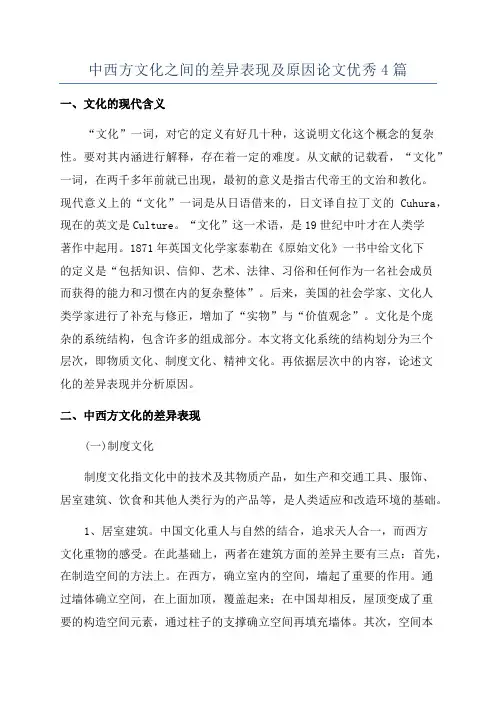
中西方文化之间的差异表现及原因论文优秀4篇一、文化的现代含义“文化”一词,对它的定义有好几十种,这说明文化这个概念的复杂性。
要对其内涵进行解释,存在着一定的难度。
从文献的记载看,“文化”一词,在两千多年前就已出现,最初的意义是指古代帝王的文治和教化。
现代意义上的“文化”一词是从日语借来的,日文译自拉丁文的 Cuhura,现在的英文是Culture。
“文化”这一术语,是19世纪中叶才在人类学著作中起用。
1871年英国文化学家泰勒在《原始文化》一书中给文化下的定义是“包括知识、信仰、艺术、法律、习俗和任何作为一名社会成员而获得的能力和习惯在内的复杂整体”。
后来,美国的社会学家、文化人类学家进行了补充与修正,增加了“实物”与“价值观念”。
文化是个庞杂的系统结构,包含许多的组成部分。
本文将文化系统的结构划分为三个层次,即物质文化、制度文化、精神文化。
再依据层次中的内容,论述文化的差异表现并分析原因。
二、中西方文化的差异表现(一)制度文化制度文化指文化中的技术及其物质产品,如生产和交通工具、服饰、居室建筑、饮食和其他人类行为的产品等,是人类适应和改造环境的基础。
1、居室建筑。
中国文化重人与自然的结合,追求天人合一,而西方文化重物的感受。
在此基础上,两者在建筑方面的差异主要有三点:首先,在制造空间的方法上。
在西方,确立室内的空间,墙起了重要的作用。
通过墙体确立空间,在上面加顶,覆盖起来;在中国却相反,屋顶变成了重要的构造空间元素,通过柱子的支撑确立空间再填充墙体。
其次,空间本身的状态。
西方强调积极的空间感,发挥建筑物本身的的内部空间;在中国,则强调相对消极的空间状态,注重建筑物周围的外部空间。
最后,中国的建筑风格与特点没有得到进一步的发展,而西方的建筑风格却大加盛行。
由此可知,中西方由于民族风格、文化心理等方面的种种差异,造成了建筑风格的迥异。
2、饮食习俗。
西方的烹调倾向于科学,多从营养学的角度去考虑菜肴的结构和食品的成分,这一饮食习惯与西方的整个哲学体系相适应,但形而上学在一定程度上又阻碍了饮食文化的发展。
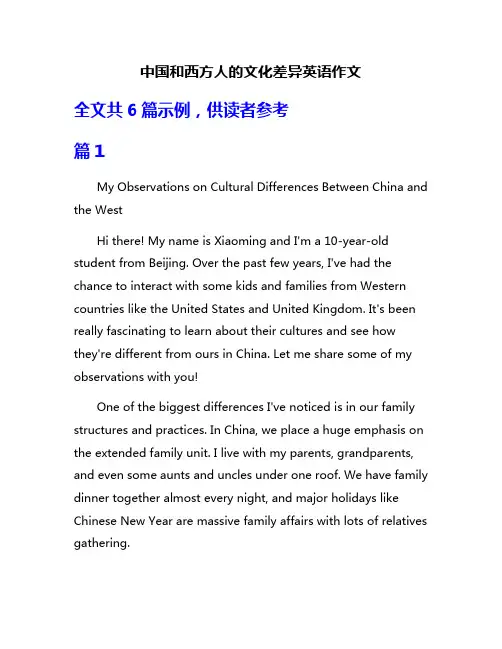
中国和西方人的文化差异英语作文全文共6篇示例,供读者参考篇1My Observations on Cultural Differences Between China and the WestHi there! My name is Xiaoming and I'm a 10-year-old student from Beijing. Over the past few years, I've had the chance to interact with some kids and families from Western countries like the United States and United Kingdom. It's been really fascinating to learn about their cultures and see how they're different from ours in China. Let me share some of my observations with you!One of the biggest differences I've noticed is in our family structures and practices. In China, we place a huge emphasis on the extended family unit. I live with my parents, grandparents, and even some aunts and uncles under one roof. We have family dinner together almost every night, and major holidays like Chinese New Year are massive family affairs with lots of relatives gathering.But many of my Western friends live in smaller nuclear families with just their parents and siblings. They don't seem to have as much involvement from grandparents, aunts, uncles and cousins in their daily lives. Their family gatherings also tend to be smaller. While I love having a big, close-knit extended family around, I can see how a smaller family setup allows kids in the West to be more independent from a younger age.Speaking of independence, that's another major contrastI've picked up on. We Chinese tend to be quite protective of our children and closely supervise them until they're teenagers. But Western parents often encourage more personal freedom and autonomy for their kids from a younger age. My American friend Jack has been making his own way to school since he was just 7 years old! I couldn't imagine doing that back then.The differences even extend to the classroom. While we Chinese students are taught to be deferential to our teachers and avoid questioning them directly, Western students seem to be encouraged to speak up, ask questions, and even debate with their teachers if they disagree. The classroom environment in the West feels a lot more interactive and focused on developing critical thinking skills.Food is where the East-West divide is really delicious though! Our Chinese cuisine uses so many different spices, sauces, cooking techniques and ingredients like noodles, dumplings, and stir-fries. In contrast, Western food to me often seems quite plain, with simple seasoning and a bigger emphasis on things like breads, cheeses, steaks and potatoes. Not that it's bad...just very different flavors that my palette had to get used to at first!One major area of overlap, however, is our love for celebrations and festivals. In China, we have iconic festivals like Chinese New Year, Mid-Autumn Festival, and Dragon Boat Festival that bring families together for feasting and fun traditions. Similarly, my Western friends go all-out for festivals like Christmas, Easter, Halloween and Thanksgiving. The specifics are different, but the spirit of celebrating together as a community is the same.I could go on, but those are some of the biggest cultural gaps I've noticed so far between China and the West. From family dynamics to food to classroom norms, it's been aneye-opening experience being exposed to another way of life. I feel really fortunate to have had this exposure at a young age - it's making me appreciate my own Chinese roots and traditions, while also building my understanding of other cultures.Who knows, maybe someday I'll move to a Western country for college or work? If I do, I'll be much better prepared for bridging any cultural divides. For now, I'm just really excited to keep learning about the world beyond China's borders. It's a big, fascinating world out there!篇2My Cultural Journey: Bridging China and the WestHi there! My name is Xiaoming, and I'm a 10-year-old student from Beijing, China. Today, I want to share with you my experience and observations about the fascinating cultural differences between my home country and the Western world.As a young learner, I've always been curious about different cultures and traditions. Last year, my family had the opportunity to visit my aunt and uncle in New York City, USA. It was aneye-opening experience that allowed me to explore and appreciate the rich diversity of the Western culture firsthand.One of the first things that caught my attention was the way people greeted each other. In China, we often bow slightly as a sign of respect, especially when meeting elders or people in authority. However, in the West, I noticed that people would shake hands, hug, or even kiss on the cheek when greeting eachother. It felt a bit strange at first, but I soon understood that it was a way of showing warmth and friendliness.Another significant difference I observed was in family dynamics. In Chinese culture, we place a strong emphasis on filial piety and respecting our elders. Children are expected to obey their parents and grandparents without question. In contrast, Western families seemed to have a more equal and open relationship between parents and children. Kids were encouraged to express their opinions and make their own choices, which was quite different from what I was used to.Food was another area where I noticed some fascinating contrasts. Chinese cuisine is known for its diverse flavors, with a focus on balance and harmony. We use a lot of fresh vegetables, rice, and noodles, and our meals are often shared family-style. On the other hand, Western meals seemed to be more individualized, with larger portions and a greater emphasis on meats and dairy products. I remember trying a cheeseburger for the first time and being amazed by the combination of flavors!In terms of education, I found the Western approach to be quite different from what I was used to in China. In my school, we have a more structured and exam-oriented curriculum, with a strong focus on memorization and repetition. However, in theWest, I noticed that students were encouraged to think critically, ask questions, and participate actively in class discussions. Group projects and hands-on activities seemed to be more common, allowing students to develop teamwork and problem-solving skills.Another aspect that fascinated me was the concept of personal space. In China, we tend to stand closer to each other and physical contact is more common, especially in crowded areas like public transportation. However, in the West, people seemed to value their personal space more, and there was a greater emphasis on maintaining a certain distance between individuals.Despite these differences, I also noticed some similarities between our cultures. For instance, both Chinese and Western societies place a high value on education and hard work. Parents in both cultures want their children to excel academically and have successful careers. Additionally, family bonds and celebrations like birthdays and holidays are cherished in both cultures, although the specific traditions and practices may differ.One thing that struck me during my visit was the diversity within the Western culture itself. New York City is a melting potof different ethnicities, religions, and backgrounds. I met people from various parts of the world, each with their own unique traditions and perspectives. It made me realize that just as China has its regional variations, the Western world is also incredibly diverse and rich in cultural tapestry.Overall, my experience in the West has broadened my horizons and deepened my appreciation for cultural diversity. While there are undoubtedly differences in customs, values, and ways of life, I've learned that at the core, we all share a common humanity. We all seek happiness, love, and fulfillment, regardless of our cultural backgrounds.As I continue to learn and grow, I hope to embrace the best of both Chinese and Western cultures. I want to maintain the values of respect, hard work, and family bonds that are deeply rooted in my Chinese heritage, while also embracing the spirit of open-mindedness, critical thinking, and individuality that I admire in Western societies.In the end, true understanding and harmony between cultures come from recognizing and celebrating our differences, while also acknowledging our shared human experiences. By building bridges of mutual respect and open communication, wecan create a world where diverse cultures coexist and enrich one another.So, my dear friends, let's embark on this incredible journey of cultural exploration together. Let's embrace the beauty of our differences and find common ground in our shared hopes, dreams, and aspirations. After all, the world is a vibrant tapestry woven with the threads of countless cultures, and it's up to us to appreciate and cherish each colorful strand.篇3Cultural Differences Between China and the WestHi everyone! My name is Xiaoming and I'm going to tell you about some of the interesting cultural differences I've noticed between China and Western countries. Culture is all the beliefs, customs, arts, foods, and ways of life that get passed down from one generation to the next. Even though we're all human beings, different cultures can have some pretty big differences!One major difference is language. In China, we speak Chinese which has lots of different dialects like Mandarin, Cantonese, and more. The writing system uses beautiful, complex characters. In Western countries though, they speak languages like English, Spanish, French, and German which usean alphabet with 26 letters. Their words look and sound really different from Chinese.Another big difference is food! Chinese food is so yummy with dishes like dumplings, noodles, rice, and stir-fries. We use chopsticks to eat. But in the West, their food is really different like bread, pasta, sandwiches, hamburgers, pizza, and more. They eat mainly with forks, knives, and spoons. Some of their food looks and tastes totally strange to me!Family is very important in Chinese culture. We often live with our grandparents, aunts, uncles and cousins all under one roof. Children are taught to respect their elders. In the West though, the families are typically smaller with just parents and children. Kids sometimes move out at age 18!Holidays are celebrated differently too. Of course, in China our biggest holiday is Chinese New Year. We decorate with red, watch dragon dances, light firecrackers, and get red envelopes with money inside! Western holidays like Christmas are centered around gift-giving, decorating trees, eating big meals, and leaving out cookies for Santa Claus.School is another area with big differences. Chinese students study really hard and our academic competition is intense. We often go to school for longer hours and on Saturdays too.Testing and getting good scores is very important. Schools in the West seem more relaxed with shorter days, longer vacations, and less testing.These are just a few examples of the differences I've noticed between Eastern and Western cultures. Of course, there are many other differences with arts, celebrations, values, customs, and more. Every culture is unique and special in its own way. Appreciating and respecting these differences helps bring harmony to our diverse world. That's what I think anyway!What do you all think? Do you notice any other cultural differences between China and the West? I'd love to hear your thoughts!篇4Cultural Differences Between China and the WestHi everyone! Today, I want to share with you some interesting facts about the cultural differences between China and the West. It's amazing how people from different parts of the world have unique traditions and customs. So, let's explore together!One big difference is the way we greet each other. In China, we often greet others by bowing or nodding our heads. We also address older people with respect, like saying "Nǐ hǎo" or "Hello" to show politeness. However, in the West, people usually shake hands when they meet someone new, and they greet each other by saying "Hi" or "How are you?" It's fascinating how a simple greeting can be different in various cultures!Food is another area where we can find cultural differences. In China, we enjoy a wide variety of dishes, such as rice, noodles, and dumplings. We often use chopsticks to eat our meals. On the other hand, in the West, people have different kinds of food like hamburgers, pizza, and sandwiches. They usually use forks, spoons, and knives to eat. It's interesting to see how our tastes and eating habits can be so diverse!Education is also a significant difference between China and the West. In China, education is highly valued, and students work hard to achieve good grades. We have long school hours and lots of homework. Respect for teachers is very important, and we listen carefully to what they say. In the West, education is also important, but there is more emphasis on creativity and critical thinking. Students often participate in group discussions andexpress their opinions freely. It's amazing how education can be approached differently in different parts of the world!Let's talk about festivals now! In China, we celebrate many colorful and exciting festivals. For example, during the Spring Festival, we have dragon dances, set off fireworks, and give red envelopes with money inside to bring good luck. In the West, there are also many festivals, like Christmas and Halloween. During Christmas, people exchange gifts and decorate Christmas trees. On Halloween, children dress up in costumes and go trick-or-treating. It's fascinating to see how festivals can be so unique and special in different cultures!Family values are important in both China and the West, but there are some differences. In China, family is considered the most important thing, and we often live with our parents and grandparents. We show respect for our elders and take care of them as they get older. In the West, children usually move out of their parents' house when they become adults and start their own families. Family bonds are still strong, but there is more emphasis on independence and individuality. It's heartwarming to see how families are valued differently across cultures!These are just a few examples of the cultural differences between China and the West. It's fascinating to learn aboutdifferent traditions, customs, and ways of life. By understanding and appreciating these differences, we can build bridges between cultures and make the world a better place. So, let's celebrate our diversity and embrace the beautiful tapestry of cultures that exists in our world!I hope you enjoyed learning about the cultural differences between China and the West. Remember, no matter where we come from, we are all unique and special in our own ways. Let's celebrate our differences and learn from one another.篇5My Culture is Different From the WestHi there! My name is Li Ming and I'm a 10-year-old student in China. Today, I want to talk about the differences between Chinese culture and Western culture. It's really interesting to see how people live in other parts of the world!One big difference is our food. In China, we love rice! It's a staple at pretty much every meal. My favorite is when my mom makes fried rice with eggs, vegetables, and a bit of soy sauce. Western food seems to be more focused on bread, pasta, and meat dishes. My friend Jack, who is from America, was reallysurprised the first time he tried dumplings and noodles at my house.Family is also very important in Chinese culture. We have a saying "家和万事兴" which means "When the family is united, every affair will prosper." From a young age, we are taught to respect our elders, especially our grandparents. It's common for multiple generations to live together under one roof. In the West, kids often move out and live independently after finishing school. Jack told me it would be really weird for him to live with his grandparents!Speaking of families, one interesting difference is how we refer to relatives. In English, you might call your aunt "Aunt Sally" using her first name. But in Chinese, we use specific terms like "gūmā" for paternal aunt or "yímā" for maternal aunt. There are also different titles for older and younger aunts, uncles, cousins, and so on. It can get quite complicated!School life is fairly similar in terms of the core subjects we study like math, science, and languages. But Chinese students often have a much heavier workload and face tremendous pressure to excel academically. We start school earlier in the day, around 7am, and have much less vacation time compared to theWest. Many kids, including me, attend extra tutoring sessions after school to keep up. My foreign friends think that's crazy!Holidays are another area of contrast. Of course, China has its own traditional festivals like Chinese New Year, Mid-Autumn Festival, and Dragon Boat Festival. These are celebrated with unique customs, foods, and activities that you don't really see in the West. Meanwhile, holidays like Christmas are widely observed by Western countries but not as much in China unless you belong to certain religions.One thing I find really fascinating is the differences in cultural values and philosophies. A lot of Chinese thought is influenced by the teachings of ancient figures like Confucius, who emphasised concepts like filial piety, harmony, and moral cultivation. Western philosophy seems to put more emphasis on topics like individual rights, freedom, and democracy. Though there is overlap too, of course!Another interesting point is how we approach interpersonal relationships and social etiquette. In Chinese culture, there's a lot of importance placed on hierarchy, propriety, and "saving face" - basically, not causing embarrassment or disrespect through your words and actions. This affects how we interact with elders,teachers, and even peers. From my understanding, Western culture tends to be more casual and direct in relationships.So those are some of the key cultural differences that strike me as a student in China. Of course, within each of these broad cultures, there's a ton of diversity too based on specific regions, ethnicities, and personal backgrounds. Every individual is unique! But I hope this gives you a glimpse into how life in China can be quite different from life in Western nations.It's really amazing to learn about the world beyond my own experience. While our cultures may differ in many ways, I think deep down, people all over the globe share some core hopes and values - we want health, happiness, and a good life for our families. I'm excited to keep learning about the fascinating cultures that make up our world.That's all from me for now! Thanks for giving me the chance to share my perspective. Let me know if you have any other questions!篇6The Differences Between Chinese and Western CulturesMy name is Li Ming and I am 10 years old. I was born in Beijing, but my family moved to Los Angeles when I was 6 years old because of my dad's job. Living in America has been really interesting and exciting, but also a bit confusing at times because of all the cultural differences between China and the West.One of the biggest differences I've noticed is in how families act. In China, the family unit is super important and there is a lot of emphasis on respecting your elders, especially grandparents. Kids are expected to obey their parents without questioning them. But many American families seem to act more casual and informal with each other. The parents let their kids talk back, disobey, and do whatever they want sometimes. It's so weird to me!Another major difference is in the food. Obviously, the cuisines are totally different, but it's about more than just the types of dishes. In China, we eat lots of shared dishes from a rotating table in the middle. In America, everyone gets their own separate plate. And Americans often eat really quickly, likethey're in a race or something. In China, meals are meant to be slow and relaxing affairs where the family can talk and bond overfood. My parents are always scolding me for wolfing down my lunch too fast here!School culture is quite different too. In China, the academic standards are much higher and kids have way more homework and test prep. The parents put a ton of pressure on their children to perform well on the annual exams that determine what good schools you can get into later. Here in America, school seems much more relaxed and focused on letting kids be creative and have fun. Don't get me wrong, I like having more free time and less stress, but I sometimes worry I'm not being challenged enough academically.Social values are another area where I've seen contrasts. Chinese culture emphasizes collectivism - promoting the interests of the group or society over the individual. Kids are taught not to stand out too much or bring excessive attention to themselves. Modesty and humility are big deals. Western cultures seem to value individualism much more, encouraging people to seek personal achievement and to confidently express themselves however they wish.Maybe the most fascinating difference of all is in people's general attitudes and approaches to life. From what I can tell, Chinese tend to have a more serious, reserved, and traditionalmindset. Things like hard work, sacrifice, and "saving face" are drilled into us from a young age. Americans often come across as more laid-back, informal, and focused on personal enjoyment and self-expression in the present moment. Not better or worse per se, just very different ways of seeing the world.It has definitely been an eye-opening experience getting to know both the Chinese and American cultures over my 10 years on this planet so far. Sometimes I feel pulled between the two mindsets and value systems. But I'm so grateful to have been exposed to such diverse perspectives at a young age. My hope is that I can take the best from both worlds as I continue growing up to become a open-minded global citizen.There are so many other differences I could discuss, like personal space expectations, approaches to conflict, understandings of courtesy and respect, and more. Cultures are endlessly fascinating to explore and compare. I may be just a kid, but I feel very lucky to have a foot in both the Chinese and Western worlds. It has already taught me that there are many lenses for viewing life, and that being open and respectful of other perspectives is the key to connecting with all people.。
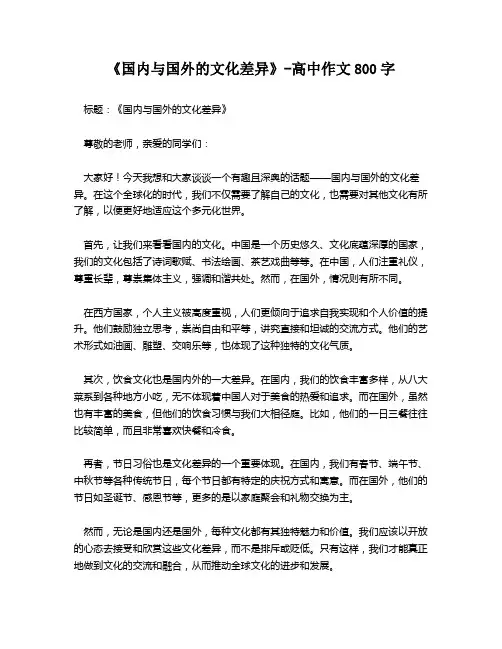
《国内与国外的文化差异》-高中作文800字标题:《国内与国外的文化差异》尊敬的老师,亲爱的同学们:大家好!今天我想和大家谈谈一个有趣且深奥的话题——国内与国外的文化差异。
在这个全球化的时代,我们不仅需要了解自己的文化,也需要对其他文化有所了解,以便更好地适应这个多元化世界。
首先,让我们来看看国内的文化。
中国是一个历史悠久、文化底蕴深厚的国家,我们的文化包括了诗词歌赋、书法绘画、茶艺戏曲等等。
在中国,人们注重礼仪,尊重长辈,尊崇集体主义,强调和谐共处。
然而,在国外,情况则有所不同。
在西方国家,个人主义被高度重视,人们更倾向于追求自我实现和个人价值的提升。
他们鼓励独立思考,崇尚自由和平等,讲究直接和坦诚的交流方式。
他们的艺术形式如油画、雕塑、交响乐等,也体现了这种独特的文化气质。
其次,饮食文化也是国内外的一大差异。
在国内,我们的饮食丰富多样,从八大菜系到各种地方小吃,无不体现着中国人对于美食的热爱和追求。
而在国外,虽然也有丰富的美食,但他们的饮食习惯与我们大相径庭。
比如,他们的一日三餐往往比较简单,而且非常喜欢快餐和冷食。
再者,节日习俗也是文化差异的一个重要体现。
在国内,我们有春节、端午节、中秋节等各种传统节日,每个节日都有特定的庆祝方式和寓意。
而在国外,他们的节日如圣诞节、感恩节等,更多的是以家庭聚会和礼物交换为主。
然而,无论是国内还是国外,每种文化都有其独特魅力和价值。
我们应该以开放的心态去接受和欣赏这些文化差异,而不是排斥或贬低。
只有这样,我们才能真正地做到文化的交流和融合,从而推动全球文化的进步和发展。
总的来说,国内与国外的文化差异体现在许多方面,包括价值观、生活方式、饮食习惯、节日习俗等等。
这些差异并不是优劣之分,而是各自文化的独特性和多样性。
我们应该珍惜并尊重这些差异,同时也要勇于探索和学习新的文化知识,以此来开阔我们的视野,丰富我们的生活。
这就是我对《国内与国外的文化差异》的一些理解和看法,希望对大家有所帮助。
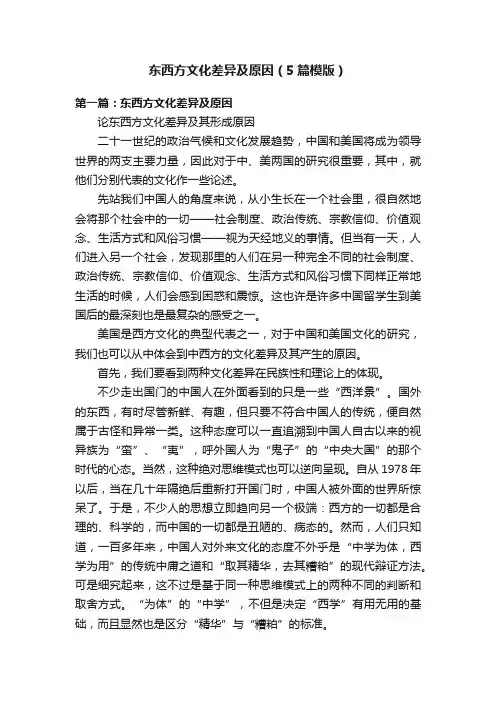
东西方文化差异及原因(5篇模版)第一篇:东西方文化差异及原因论东西方文化差异及其形成原因二十一世纪的政治气候和文化发展趋势,中国和美国将成为领导世界的两支主要力量,因此对于中、美两国的研究很重要,其中,就他们分别代表的文化作一些论述。
先站我们中国人的角度来说,从小生长在一个社会里,很自然地会将那个社会中的一切——社会制度、政治传统、宗教信仰、价值观念、生活方式和风俗习惯——视为天经地义的事情。
但当有一天,人们进入另一个社会,发现那里的人们在另一种完全不同的社会制度、政治传统、宗教信仰、价值观念、生活方式和风俗习惯下同样正常地生活的时候,人们会感到困惑和震惊。
这也许是许多中国留学生到美国后的最深刻也是最复杂的感受之一。
美国是西方文化的典型代表之一,对于中国和美国文化的研究,我们也可以从中体会到中西方的文化差异及其产生的原因。
首先,我们要看到两种文化差异在民族性和理论上的体现。
不少走出国门的中国人在外面看到的只是一些“西洋景”。
国外的东西,有时尽管新鲜、有趣,但只要不符合中国人的传统,便自然属于古怪和异常一类。
这种态度可以一直追溯到中国人自古以来的视异族为“蛮”、“夷”,呼外国人为“鬼子”的“中央大国”的那个时代的心态。
当然,这种绝对思维模式也可以逆向呈现。
自从1978年以后,当在几十年隔绝后重新打开国门时,中国人被外面的世界所惊呆了。
于是,不少人的思想立即趋向另一个极端:西方的一切都是合理的、科学的,而中国的一切都是丑陋的、病态的。
然而,人们只知道,一百多年来,中国人对外来文化的态度不外乎是“中学为体,西学为用”的传统中庸之道和“取其精华,去其糟粕”的现代辩证方法。
可是细究起来,这不过是基于同一种思维模式上的两种不同的判断和取舍方式。
“为体”的“中学”,不但是决定“西学”有用无用的基础,而且显然也是区分“精华”与“糟粕”的标准。
美国人在这方面有着几乎同样的问题。
一百多年和平发展所造就的强大的经济力量、先进的科学技术、逐渐完善的民主体制和日渐流行的大众文化,使美国人过于自以为是,以为美国的社会模式是各国都应仿效的“样板”,美式的价值观念更是衡量世界上一切事物的绝对标准,而很少意识到美国只是人类社会发展史上的一个例子,并很可能是一个颇具特殊性的例子。
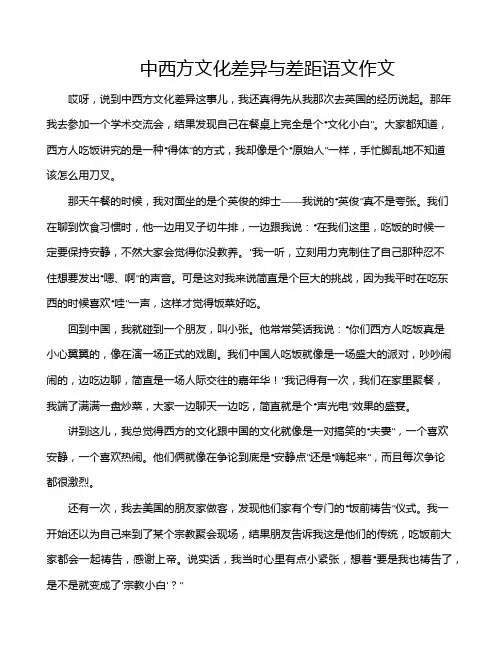
中西方文化差异与差距语文作文哎呀,说到中西方文化差异这事儿,我还真得先从我那次去英国的经历说起。
那年我去参加一个学术交流会,结果发现自己在餐桌上完全是个“文化小白”。
大家都知道,西方人吃饭讲究的是一种“得体”的方式,我却像是个“原始人”一样,手忙脚乱地不知道该怎么用刀叉。
那天午餐的时候,我对面坐的是个英俊的绅士——我说的“英俊”真不是夸张。
我们在聊到饮食习惯时,他一边用叉子切牛排,一边跟我说:“在我们这里,吃饭的时候一定要保持安静,不然大家会觉得你没教养。
”我一听,立刻用力克制住了自己那种忍不住想要发出“嗯、啊”的声音。
可是这对我来说简直是个巨大的挑战,因为我平时在吃东西的时候喜欢“哇”一声,这样才觉得饭菜好吃。
回到中国,我就碰到一个朋友,叫小张。
他常常笑话我说:“你们西方人吃饭真是小心翼翼的,像在演一场正式的戏剧。
我们中国人吃饭就像是一场盛大的派对,吵吵闹闹的,边吃边聊,简直是一场人际交往的嘉年华!”我记得有一次,我们在家里聚餐,我端了满满一盘炒菜,大家一边聊天一边吃,简直就是个“声光电”效果的盛宴。
讲到这儿,我总觉得西方的文化跟中国的文化就像是一对搞笑的“夫妻”,一个喜欢安静,一个喜欢热闹。
他们俩就像在争论到底是“安静点”还是“嗨起来”,而且每次争论都很激烈。
还有一次,我去美国的朋友家做客,发现他们家有个专门的“饭前祷告”仪式。
我一开始还以为自己来到了某个宗教聚会现场,结果朋友告诉我这是他们的传统,吃饭前大家都会一起祷告,感谢上帝。
说实话,我当时心里有点小紧张,想着“要是我也祷告了,是不是就变成了‘宗教小白’?”而在中国,我们的饭前准备是这样:家里的人都在争抢最后一个菜,菜盘子里剩下的最后一点儿肉都被抢得干干净净,吃得时候还要“你尝尝这个,我尝尝那个”,完全是一种社交狂欢的模式。
总的来说,东西方文化差异确实让人哭笑不得,吃饭方式只是其中之一。
其实,最有趣的是,虽然我们在细节上有所不同,但最终我们都在用自己的方式享受生活,这就是文化的魅力所在吧。
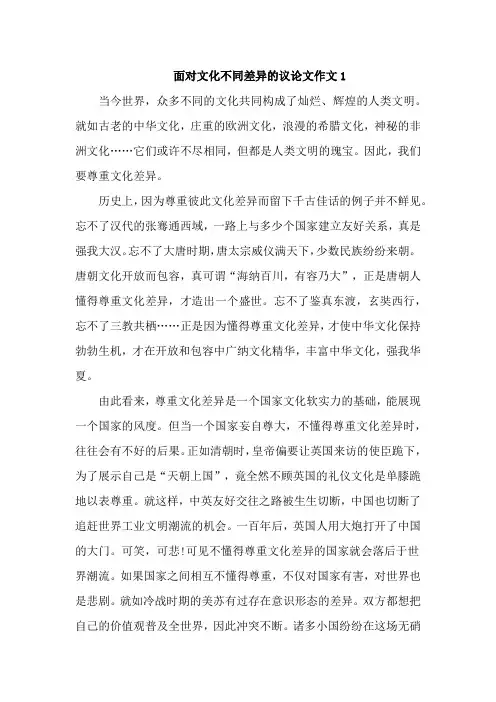
面对文化不同差异的议论文作文1当今世界,众多不同的文化共同构成了灿烂、辉煌的人类文明。
就如古老的中华文化,庄重的欧洲文化,浪漫的希腊文化,神秘的非洲文化……它们或许不尽相同,但都是人类文明的瑰宝。
因此,我们要尊重文化差异。
历史上,因为尊重彼此文化差异而留下千古佳话的例子并不鲜见。
忘不了汉代的张骞通西域,一路上与多少个国家建立友好关系,真是强我大汉。
忘不了大唐时期,唐太宗威仪满天下,少数民族纷纷来朝。
唐朝文化开放而包容,真可谓“海纳百川,有容乃大”,正是唐朝人懂得尊重文化差异,才造出一个盛世。
忘不了鉴真东渡,玄奘西行,忘不了三教共栖……正是因为懂得尊重文化差异,才使中华文化保持勃勃生机,才在开放和包容中广纳文化精华,丰富中华文化,强我华夏。
由此看来,尊重文化差异是一个国家文化软实力的基础,能展现一个国家的风度。
但当一个国家妄自尊大,不懂得尊重文化差异时,往往会有不好的后果。
正如清朝时,皇帝偏要让英国来访的使臣跪下,为了展示自己是“天朝上国”,竟全然不顾英国的礼仪文化是单膝跪地以表尊重。
就这样,中英友好交往之路被生生切断,中国也切断了追赶世界工业文明潮流的机会。
一百年后,英国人用大炮打开了中国的大门。
可笑,可悲!可见不懂得尊重文化差异的国家就会落后于世界潮流。
如果国家之间相互不懂得尊重,不仅对国家有害,对世界也是悲剧。
就如冷战时期的美苏有过存在意识形态的差异。
双方都想把自己的价值观普及全世界,因此冲突不断。
诸多小国纷纷在这场无硝烟的战争中遭殃,经济全球化也只能是“半球化”……不懂得尊重文化差异,不利于世界和平与发展。
大家知道,新中国之所以能取得如此大的外交成就,是因为我们懂得尊重文化差异。
周恩来曾提出“求同存异”方针、“和平共处五项原则”,赢得了国际社会的尊重,为新中国创造了一个良好的外交环境。
七十年过去了,中国始终践行着这条道路。
领导人在出席国际会议时,经常穿着主办国的传统服饰,当外国朋友来到中国时,我们也尊重他们的宗教信仰和风俗习惯。
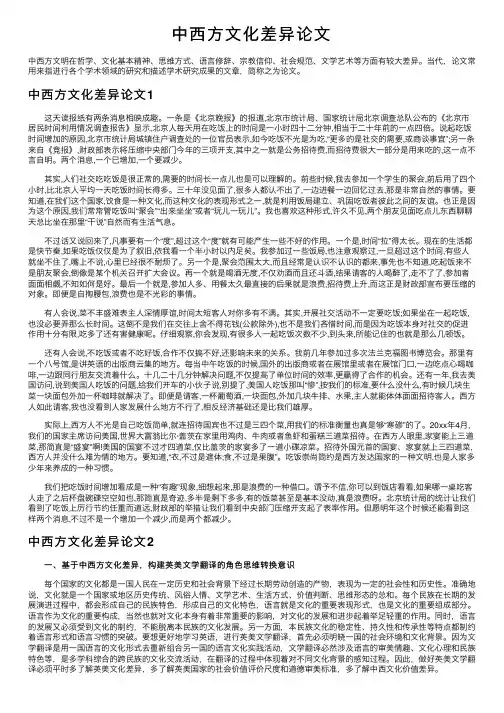
中西⽅⽂化差异论⽂中西⽅⽂明在哲学、⽂化基本精神、思维⽅式、语⾔修辞、宗教信仰、社会规范、⽂学艺术等⽅⾯有较⼤差异。
当代,论⽂常⽤来指进⾏各个学术领域的研究和描述学术研究成果的⽂章,简称之为论⽂。
中西⽅⽂化差异论⽂1 这天读报纸有两条消息相映成趣。
⼀条是《北京晚报》的报道,北京市统计局、国家统计局北京调查总队公布的《北京市居民时间利⽤情况调查报告》显⽰,北京⼈每天⽤在吃饭上的时间是⼀⼩时四⼗⼆分钟,相当于⼆⼗年前的⼀点四倍。
说起吃饭时间增加的原因,北京市统计局城镇住户调查处的⼀位官员表⽰,如今吃饭不光是为吃,“更多的是社交的需要,或商谈事宜”;另⼀条来⾃《竞报》,财政部表⽰将压缩中央部门今年的三项开⽀,其中之⼀就是公务招待费,⽽招待费很⼤⼀部分是⽤来吃的,这⼀点不⾔⾃明。
两个消息,⼀个已增加,⼀个要减少。
其实,⼈们社交吃吃饭是很正常的,需要的时间长⼀点⼉也是可以理解的。
前些时候,我去参加⼀个学⽣的聚会,前后⽤了四个⼩时,⽐北京⼈平均⼀天吃饭时间长得多。
三⼗年没见⾯了,很多⼈都认不出了,⼀边进餐⼀边回忆过去,那是⾮常⾃然的事情。
要知道,在我们这个国家,饮⾷是⼀种⽂化,⽽这种⽂化的表现形式之⼀,就是利⽤饭局建⽴、巩固吃饭者彼此之间的友谊。
也正是因为这个原因,我们常常管吃饭叫“聚会”“出来坐坐”或者“玩⼉⼀玩⼉”。
我也喜欢这种形式,许久不见,两个朋友见⾯吃点⼉东西聊聊天总⽐坐在那⾥“⼲说”⾃然⽽有⽣活⽓息。
不过话⼜说回来了,凡事要有⼀个“度”,超过这个“度”就有可能产⽣⼀些不好的作⽤。
⼀个是,时间“拉”得太长。
现在的⽣活都是快节奏,如果吃饭仅仅是为了叙旧,依我看⼀个半⼩时以内⾜矣。
我参加过⼀些饭局,也注意观察过,⼀旦超过这个时间,有些⼈就坐不住了,嘴上不说,⼼⾥已经很不耐烦了。
另⼀个是,聚会范围太⼤,⽽且经常是认识不认识的都来,事先也不知道,吃起饭来不是朋友聚会,倒像是某个机关召开扩⼤会议。
再⼀个就是喝酒⽆度,不仅劝酒⽽且还⽃酒,结果请客的⼈喝醉了,⾛不了了,参加者⾯⾯相觑,不知如何是好。
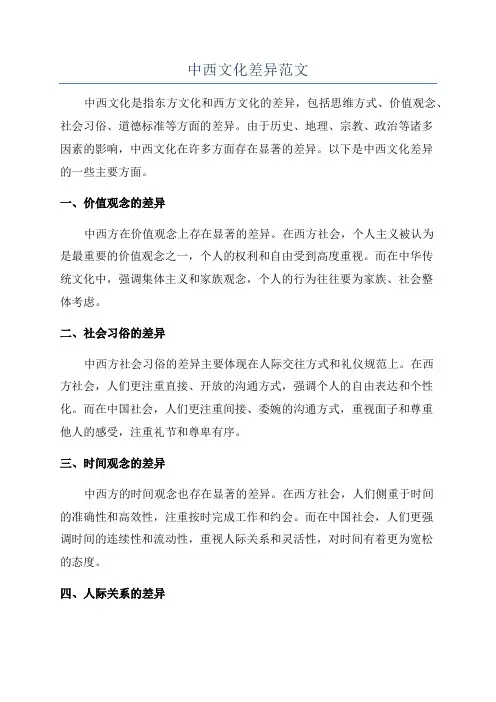
中西文化差异范文中西文化是指东方文化和西方文化的差异,包括思维方式、价值观念、社会习俗、道德标准等方面的差异。
由于历史、地理、宗教、政治等诸多因素的影响,中西文化在许多方面存在显著的差异。
以下是中西文化差异的一些主要方面。
一、价值观念的差异中西方在价值观念上存在显著的差异。
在西方社会,个人主义被认为是最重要的价值观念之一,个人的权利和自由受到高度重视。
而在中华传统文化中,强调集体主义和家族观念,个人的行为往往要为家族、社会整体考虑。
二、社会习俗的差异中西方社会习俗的差异主要体现在人际交往方式和礼仪规范上。
在西方社会,人们更注重直接、开放的沟通方式,强调个人的自由表达和个性化。
而在中国社会,人们更注重间接、委婉的沟通方式,重视面子和尊重他人的感受,注重礼节和尊卑有序。
三、时间观念的差异中西方的时间观念也存在显著的差异。
在西方社会,人们侧重于时间的准确性和高效性,注重按时完成工作和约会。
而在中国社会,人们更强调时间的连续性和流动性,重视人际关系和灵活性,对时间有着更为宽松的态度。
四、人际关系的差异中西方在人际关系方面存在较大的差异。
在西方社会,人们更注重个人的权利和隐私,强调个人的独立性和自主性。
而在中国社会,人们更注重社会关系和人情味,重视亲友关系和社会网络,强调集体的荣誉和责任。
五、宗教信仰的差异宗教信仰是中西方文化差异的重要方面。
在西方社会,基督教是主要宗教,信仰上帝和耶稣基督。
而在中国社会,佛教、道教和儒家思想等是主要的宗教信仰,强调修身齐家治国平天下和追求内心的和谐。
六、教育观念的差异中西方的教育观念存在显著的差异。
在西方社会,个人发展和实用性教育受到重视,培养学生独立思考和解决问题的能力。
而在中国社会,强调集体的荣誉和责任,注重传统文化的传承和培养学生的道德品质。
七、饮食文化的差异中西方的饮食文化也存在差异。
西方人注重食物的多样性和口味的刺激,常食用肉类和乳制品,注重饮食的健康和均衡。
而中国人注重食物的质地和味道,食用大量的谷物、蔬菜和豆类,追求饮食的协调和养生的效果。
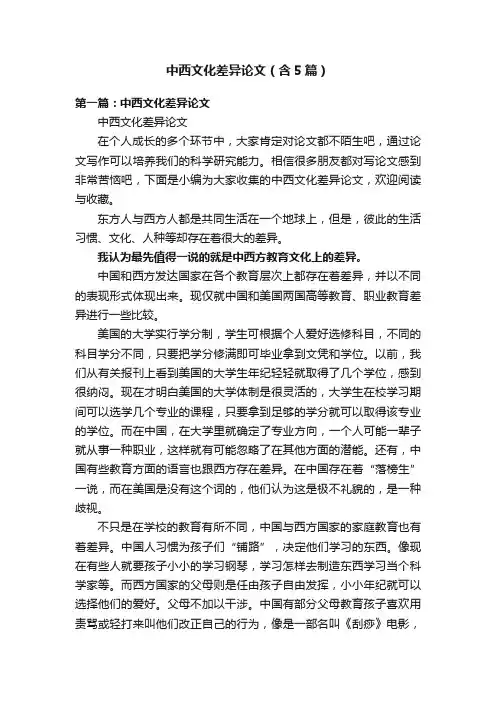
中西文化差异论文(含5篇)第一篇:中西文化差异论文中西文化差异论文在个人成长的多个环节中,大家肯定对论文都不陌生吧,通过论文写作可以培养我们的科学研究能力。
相信很多朋友都对写论文感到非常苦恼吧,下面是小编为大家收集的中西文化差异论文,欢迎阅读与收藏。
东方人与西方人都是共同生活在一个地球上,但是,彼此的生活习惯、文化、人种等却存在着很大的差异。
我认为最先值得一说的就是中西方教育文化上的差异。
中国和西方发达国家在各个教育层次上都存在着差异,并以不同的表现形式体现出来。
现仅就中国和美国两国高等教育、职业教育差异进行一些比较。
美国的大学实行学分制,学生可根据个人爱好选修科目,不同的科目学分不同,只要把学分修满即可毕业拿到文凭和学位。
以前,我们从有关报刊上看到美国的大学生年纪轻轻就取得了几个学位,感到很纳闷。
现在才明白美国的大学体制是很灵活的,大学生在校学习期间可以选学几个专业的课程,只要拿到足够的学分就可以取得该专业的学位。
而在中国,在大学里就确定了专业方向,一个人可能一辈子就从事一种职业,这样就有可能忽略了在其他方面的潜能。
还有,中国有些教育方面的语言也跟西方存在差异。
在中国存在着“落榜生”一说,而在美国是没有这个词的,他们认为这是极不礼貌的,是一种歧视。
不只是在学校的教育有所不同,中国与西方国家的家庭教育也有着差异。
中国人习惯为孩子们“铺路”,决定他们学习的东西。
像现在有些人就要孩子小小的学习钢琴,学习怎样去制造东西学习当个科学家等。
而西方国家的父母则是任由孩子自由发挥,小小年纪就可以选择他们的爱好。
父母不加以干涉。
中国有部分父母教育孩子喜欢用责骂或轻打来叫他们改正自己的行为,像是一部名叫《刮痧》电影,里面男主角为了让打了人的孩子受到教训,为了给别人他认为的尊重打了孩子一巴掌。
然而,在西方国家,父母绝对不可以对孩子施以肢体方面的教育,假如有这种行为,就会被当做虐待儿童,可能要“吃牢饭”。
像《刮痧》里的男主角就是因为他打孩子这一巴掌,被别人拿来当做虐待儿童的证据了。
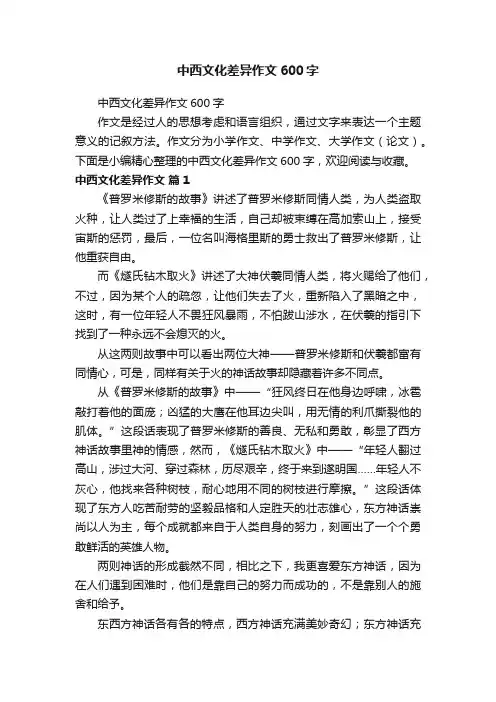
中西文化差异作文600字中西文化差异作文600字作文是经过人的思想考虑和语言组织,通过文字来表达一个主题意义的记叙方法。
作文分为小学作文、中学作文、大学作文(论文)。
下面是小编精心整理的中西文化差异作文600字,欢迎阅读与收藏。
中西文化差异作文篇1《普罗米修斯的故事》讲述了普罗米修斯同情人类,为人类盗取火种,让人类过了上幸福的生活,自己却被束缚在高加索山上,接受宙斯的惩罚,最后,一位名叫海格里斯的勇士救出了普罗米修斯,让他重获自由。
而《燧氏钻木取火》讲述了大神伏羲同情人类,将火赐给了他们,不过,因为某个人的疏忽,让他们失去了火,重新陷入了黑暗之中,这时,有一位年轻人不畏狂风暴雨,不怕跋山涉水,在伏羲的指引下找到了一种永远不会熄灭的火。
从这两则故事中可以看出两位大神——普罗米修斯和伏羲都富有同情心,可是,同样有关于火的神话故事却隐藏着许多不同点。
从《普罗米修斯的故事》中——“狂风终日在他身边呼啸,冰雹敲打着他的面庞;凶猛的大鹰在他耳边尖叫,用无情的利爪撕裂他的肌体。
”这段话表现了普罗米修斯的善良、无私和勇敢,彰显了西方神话故事里神的情感,然而,《燧氏钻木取火》中——“年轻人翻过高山,涉过大河、穿过森林,历尽艰辛,终于来到遂明国……年轻人不灰心,他找来各种树枝,耐心地用不同的树枝进行摩擦。
”这段话体现了东方人吃苦耐劳的坚毅品格和人定胜天的壮志雄心,东方神话崇尚以人为主,每个成就都来自于人类自身的努力,刻画出了一个个勇敢鲜活的英雄人物。
两则神话的形成截然不同,相比之下,我更喜爱东方神话,因为在人们遇到困难时,他们是靠自己的努力而成功的,不是靠别人的施舍和给予。
东西方神话各有各的特点,西方神话充满美妙奇幻;东方神话充满艰辛智慧,这也让我明白了世界是多元的、美好的。
中西文化差异作文篇2当传统国学文化与西方文化相遇,当圣诞节与春节“撞车”,随着时代的发展进步,人们越来越趋向于欣赏西方文化。
如今,“崇洋媚外”已成为一种风尚;“抨击传统文化,赞赏西方文化“似乎是文学家教育家津津乐道的话题;越来越多的家长希望自己的孩子出国接受国外的教育……我不得不思索,难道中华五千年源远流长的传统文化真的比不上西方文化吗?其实不然。
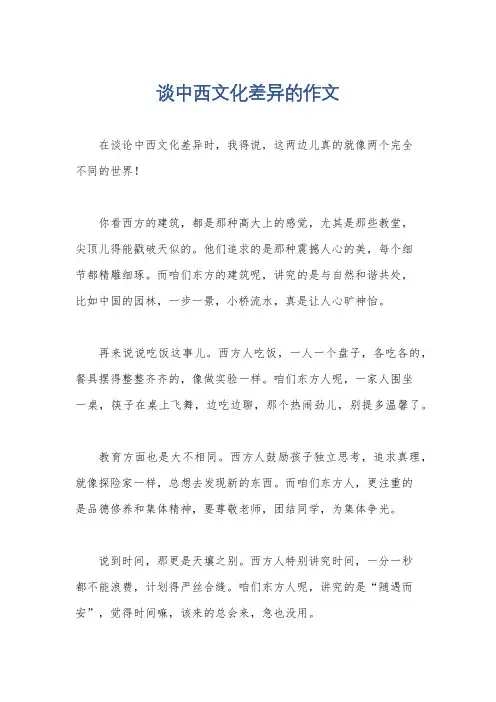
谈中西文化差异的作文
在谈论中西文化差异时,我得说,这两边儿真的就像两个完全
不同的世界!
你看西方的建筑,都是那种高大上的感觉,尤其是那些教堂,
尖顶儿得能戳破天似的。
他们追求的是那种震撼人心的美,每个细
节都精雕细琢。
而咱们东方的建筑呢,讲究的是与自然和谐共处,
比如中国的园林,一步一景,小桥流水,真是让人心旷神怡。
再来说说吃饭这事儿。
西方人吃饭,一人一个盘子,各吃各的,餐具摆得整整齐齐的,像做实验一样。
咱们东方人呢,一家人围坐
一桌,筷子在桌上飞舞,边吃边聊,那个热闹劲儿,别提多温馨了。
教育方面也是大不相同。
西方人鼓励孩子独立思考,追求真理,就像探险家一样,总想去发现新的东西。
而咱们东方人,更注重的
是品德修养和集体精神,要尊敬老师,团结同学,为集体争光。
说到时间,那更是天壤之别。
西方人特别讲究时间,一分一秒
都不能浪费,计划得严丝合缝。
咱们东方人呢,讲究的是“随遇而安”,觉得时间嘛,该来的总会来,急也没用。
总之,中西文化就是各有各的好,各有各的妙。
咱们得尊重这些差异,让文化的多样性在世界上绽放出更美的光彩!。
中西方文化差异论文篇一:中西文化差异论文中西文化差异中国历史悠久五千年,西方世界五六百年的足迹社会历程,文化差异却很大。
中西文化差异研究引起社会的普遍关注。
这反映了时代的变化和要求。
文化差异研究的基本目的是培养对文化差异的积极理解的态度,是培养不同文化接触时的适应能力和文化交际的技能。
随着经济全球化的到来,我国对外开放的下一阶段工业部门扩大,走出国门或留在国内参与跨文化交际的人越来越多,我们都需要学习、掌握与不同文化内涵,而这种差异来自中西的思维方式和处世哲学。
正是基于这一点,本文就中西文化差异做简单简单的的论述。
(一)中西文化差异的表现:一、思维模式的异同中国人站在生命的更高处思考问题,跳出现实,重视对生命的思考。
人与人之间,人与自然之间,人的精神和肉体之间的关系都人会有深刻的思考。
而西方人更注重于从物质愈世界入手,去探索和求证问题的本源。
中国人属于抽象思维或知性思维。
而西方人近似于判断能力逻辑思维或理性思维。
在西方人的眼里,自然也就从天然需要崇拜的第三类,转变为降服需要去征服和加以改造的对象,目的当然是以使其为人类更好的服务。
为了达到这一目的,人类就不得不去研究身周的事物,去研究自然。
因此,西方人一直秉持实用的原则去对待自然,去解决现有的结构性问题,习惯于从微观角度去认识具体的事物,而很少从宏观的角度去认识整个世界。
二、在为人处事方面的异同中国人很内敛,喜欢“每日三省吾身”,把修心养性看得非常重要,推崇中庸思想,导致思想保守,缺乏创新和开拓进取精神。
而西方人当更热心梅恩县于公益事业,把服务社会当成自己的职责。
三、民主观念的异同中国注重精神的自由,看作古时人们更是把自由看做是君主权贵的赏赐。
所以我们的国民总是在渴望能有好官出现为民官谋利。
而西方的民权政治认为,政出于民,一切的政权只是各族人民授予,让政府来行使权力的。
四、教育理念的异同中国和西方发达国家在各个层次上都存在着差异,并以不同的表现形式体现出来。
中西文化差异的作文500字
对于中、西如此之大的文化差异,我们每一个关心、重视中、西文化的人都应给以万分的关注。
下面我从几个不同的方面具体谈谈中西文化的差异:
第一,信仰方面。
在中国的儒、释、道文化之中,以儒家为主,也可以说,几千年来儒家文化担当了中国主流文化的角色,而基督教一直都是西方人的共同文化,它分为天主教、东正教、新教三大教派,它们都共同信仰《圣经》。
第二,衣着方面。
中西服饰受其各自不同哲学和文化的影响体现出不同的特征,儒家思想和大陆文明使中国服饰呈现出繁冗,宽博的特征。
它不注重外表的装饰,以宽松的衣服遮掩身体的曲线,在思想上追求人格的完美,以“谦谦君子”的风范来维护良好的人际关系;而西方属于海洋文明,强调主观与客观的分离,理性看待服饰,主张释放个性,利用各种剪裁,色彩搭配等手段来完美身体曲线。
第三,饮食方面。
中国饮食一切以菜的味的美好、谐调为度,度以内的千变万化就决定了中国菜的丰富和富于变化,决定了中国菜菜系的特点;西方则是一种理性饮食观念,不论食物的色、香、味、形如何,而营养一定要得到保证,讲究一天要摄取多少热量、维生素、蛋白质等等。
第四,建筑方面。
中国建筑是木头的艺术,而西方建筑是石头的艺术。
从另一个角度看,建筑就是一种民族文化心理的反映,西方建
筑的一个特点是对外开放,中国建筑的特点则刚好相反,自我封闭,从帝王的宫殿到贫民百姓的四合院,都要修建一堵越高越好的墙。
第五,医术方面。
中医更多起源于人们医疗和解毒的实用过程中,而西医起源于逻辑,以尝试和经验为主的中医不注重实验的受控性,而西医古代实验发挥了基础研究的特长,不断为临床提供新的理论解释,故其存在、发展得到承认和重视。
如何认识中西文化差异与交流作文中西文化差异与交流。
嘿,你知道吗?中西文化,简直就是两个不同的宇宙!就说打
招呼吧,咱们中国人见面就问“吃了吗?”、“去哪儿?”啥的,
显得特别亲切。
可在西方国家,人们见面就聊天气,真是奇怪!
说到节日,那就更有意思了。
咱们过年,鞭炮齐鸣,家家户户
贴春联、吃团圆饭,那氛围,简直了!而在西方,圣诞节时,大家
都去教堂、互送礼物,还有火鸡大餐,也是热闹非凡。
再来说说饮食吧。
中国的菜系,那真是五花八门,酸甜苦辣咸,啥味都有。
而在西方,人们更偏爱简单的食物,比如汉堡、薯条啥的,虽然好吃,但吃多了也腻。
不过,虽然文化不同,但咱们也能玩到一起。
比如,现在好多
西方人也开始学中文,尝试用筷子吃饭,还有不少人喜欢中国功夫呢!这说明,只要互相尊重、理解,中西文化也能碰撞出不一样的
火花。
所以啊,我觉得中西文化差异并不可怕,反而是一种宝贵的资源。
咱们应该多了解、多交流,让两种文化互相融合,创造出更多美好的事物。
对待中西文化交流中的差异作文在如今这个全球化的时代,中西文化交流那是越来越频繁啦。
就像我们每天会遇到各种各样的人和事一样,中西文化的碰撞也是在所难免。
这其中的差异啊,有时候能让我们大开眼界,有时候也会让我们有点摸不着头脑。
咱先来说说饮食文化。
咱们中国人讲究团圆,吃饭喜欢围坐在一起,热热闹闹的,菜也是一道道往桌上摆。
可西方人呢,经常是一人一份,各吃各的,简单直接。
想象一下,要是一个西方人参加咱中国的家庭聚餐,看到满桌的菜和一群人互相夹菜、敬酒,说不定会被这热闹劲儿给“吓”到。
而咱们要是去吃西餐,面对那小小的一份牛排和安静的就餐环境,可能也会觉得有点拘束。
还有交流方式的不同。
咱中国人说话比较含蓄,很多时候话里有话,得靠对方去领会。
比如说“下次一起吃饭啊”,可能不一定是真的马上就约了下一顿饭,只是一种客气。
但西方人往往就比较直接,心里想啥就说啥。
要是咱跟他们交流的时候没搞清楚这一点,说不定会产生误会,觉得对方太直白,没礼貌;他们也可能觉得咱们太绕弯子,不好懂。
不过啊,这些差异可不是用来让我们互相嫌弃的,而是让我们相互学习、相互欣赏的好机会。
比如说,我们可以从西方人的直接中学会更坦率地表达自己的想法,他们也能从我们的含蓄里体会到语言的韵味和人情的温暖。
在面对中西文化交流中的差异时,咱们可不能像个胆小鬼一样躲起来,或者像个骄傲的大公鸡一样谁也瞧不上。
得有一颗开放的心,去了解、去尊重。
就像品尝美食一样,不管是中餐还是西餐,都要用心去感受其中的独特魅力。
中西文化交流中的差异是丰富多彩的,就像一个大花园里各种各样的花朵,每一朵都有它的美丽。
让我们用包容和好奇的心态去对待,这样才能让这个花园更加绚丽多彩!。
中西文化差异作文500字
中西文化差异。
哎呀,说到节日,中西方的差距可真不小。
你看,西方的圣诞节,大家都忙着买礼物、装饰圣诞树,还期待着圣诞老人送礼物。
而在咱们中国,春节可是个大日子,家家户户贴春联、放鞭炮,还有舞龙舞狮,热闹得不得了!
说到吃的,中西方的差异就更大了。
西餐嘛,一般都是原汁原味,简单烹饪一下就行。
可咱们中餐呢,不仅要色香味俱全,还得用各种调料和烹饪技巧,真是千变万化!每次吃中餐,都觉得像在品尝一场盛宴。
还有啊,社交礼仪上也不一样。
西方人比较注重个人空间和隐私,跟人交往时都保持一定的距离。
可在咱们中国,大家都喜欢热热闹闹的,亲戚朋友聚在一起,亲密得不得了。
有时候去别人家做客,感觉就像在自己家一样。
另外,艺术表达上也不一样。
西方的艺术作品,比如油画、雕塑,都很有创意,冲击力很强。
而咱们中国的艺术作品,比如水墨
画、书法,更注重意境和情感表达,看起来很有内涵。
每次欣赏中
西方艺术作品,都觉得各有千秋,各有魅力。
总的来说,中西方的文化真是各有特色,各有千秋。
虽然有时
候觉得差异挺大的,但也正是这种差异,让世界变得更加丰富多彩。
中西文化差异解决作文
《当东方遇见西方》
嘿,你们知道吗?有一次我去参加一个国际交流活动,那可真是让我深切地感受到了中西文化的差异呀!
活动现场来了很多不同国家的人,我和一个来自西方的朋友分到了一组做游戏。
游戏规则其实挺简单,就是接力比赛。
当轮到他跑的时候,哇哦,那家伙就像脱缰的野马一样冲了出去,速度贼快,完全是一种尽情释放、毫无顾忌的感觉。
等我跑的时候呢,我还想着要保持点形象,不能太失态啦,就跑得比较稳当。
等游戏结束后,他对我的表现有点不能理解,说我为啥不放开跑呀。
我就笑着跟他解释,咱中国人有时候还是比较在意形象的嘛。
他听完直摇头,觉得不可思议。
在交流过程中,我们一起吃东西。
我发现他们西方人吃东西好像没那么多讲究,拿起食物就大口吃起来。
而我从小就习惯了细嚼慢咽,吃东西比较文雅。
他看我吃得慢悠悠的,还打趣我说是不是不喜欢那些食物。
我赶忙解释说不是不喜欢,只是习惯不一样呀。
通过这一天的相处,我是真真切切地感受到了中西文化的差异还挺大的。
但也正是这种差异,才让这个世界变得更加丰富多彩呢,不是吗?就像那句话说的,各有各的好呀。
所以呀,面对这些差异,我们不要去排斥或者试图改变,而应该去理解、去包容,这样才能让不同文化更好地交流和融合呀。
哎,这次体验还真是挺有意思的呢,让我一直都忘不了,哈哈!
这就是我所经历的关于中西文化差异的一件小事啦,希望能让你们更加直观地了解到这些有趣的不同之处哟!。
论中西文化差异-高一作文
当传统国学文化与西方文化相遇,当圣诞节与春节“撞车”,随
着时代的发展进步,人们越来越趋向于欣赏西方文化。
如今,“崇洋
媚外”已成为一种风尚;“抨击传统文化,赞赏西方文化“似乎是文
学家教育家津津乐道的话题;越来越多的家长希望自己的孩子出国接受国外的教育……我不得不思索,难道中华五千年源远流长的传统文化真的比不上西方文化吗?
其实不然。
中西方文化的起源不同,二者追求的信仰也不一样。
我们的东方文化受到佛教、以孔子为首的儒家思想和老子的道教思想影响深远,主要追求精神的超脱,追求礼孝忠义,注重个人修养和人与自然的和谐相处。
而西方文化起源于古希腊罗马文化,他们拥有平等、自由和开放的观念,追求个人权利以及对自然的探索和求证。
因此,中西方文化存在明显的差异,
在文化教育方面,中西方各领风骚。
传统国学文化深受儒家影响,中国的教育也注重于培养学生的个人素质,注重基础教育和因材施教。
虽说应试教育不利于学生的全面发展,但是我们不能全盘否定我国的教育方式。
考试是对学生在某个阶段学习效果的检验。
应试教育有助于培养学生的自我思考和独立自主能力。
而在西方,无论是在学校还是在家庭都很注重培养一个人的动手和实践能力。
曾经有一个二年级的中国孩子,随父母去美国读小学,它的教师告诉他父母说:“我可
以告诉你,六年级以前,他们的数学不用学了!”
中西方文化教育的不同直接导致了人们性格修养不同。
中国人热情好客,关心和询问别人的身体健康状况是一种有礼貌,有修养的表现。
人们一般见面都喜欢相互寒暄:“你吃饭了吗?”“最近过得怎么样?”而西方人喜欢尊重他人隐私,所以才以谈论天气,生活来避免尴尬。
中国人提倡默默无闻和无私奉献精神,以集体利益为重,个人利益为轻,崇尚助人为乐和不求回报。
但是西方人的自我中心意识很强,他们个人荣誉感极强,把个人利益放在第一位,并且推崇个人奋斗,强调多劳多得。
传统国学文化历史悠久,源远流长。
漫步在历史的长廊中,我们可以细细品味抒写美的爱情,反映现实生活的《诗经》。
穿越过春秋战国时期的百家争鸣的文化盛宴,我们有唐诗宋词元曲明清小说……伟大的祖先留给我们的文化瑰宝如同满天繁星般璀璨,是每个民族都可望不可及的。
传统国学文化是华夏子女的历史财富,是我国全人类的文化遗产,我们应当学会珍惜。
面对着中西方文化的差异,当外来文化“入侵”时,我们应当取之精华,采取谦虚,不卑不亢的态度。
对于我们的传统文化,我们则需要总结提炼其精华,推崇提倡中华民族文化之瑰宝,才能培养更高素质的人才。